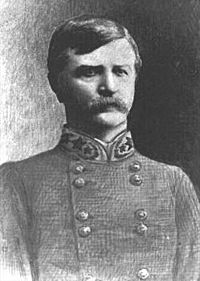George Doherty Johnston facts for kids
Quick facts for kids
George Doherty Johnston
|
|
|---|---|
 |
|
| Born | May 30, 1832 Hillsborough, North Carolina |
| Died | December 8, 1910 (aged 78) Tuscaloosa, Alabama |
| Place of burial |
Greenwood Cemetery Tuscaloosa, Alabama
|
| Allegiance | |
| Service/ |
|
| Years of service | 1861–65 |
| Rank | Brigadier General |
| Commands held | |
| Battles/wars | American Civil War |
| Other work | Politician; Educator |
George Doherty Johnston was an important leader during the American Civil War. He was a brigadier general in the Confederate States Army. He was born on May 30, 1832, and passed away on December 8, 1910.
Contents
Early Life and Education
George Doherty Johnston was born in Hillsborough, North Carolina. When he was two years old, his family moved to Greensboro, Alabama. Sadly, his father passed away soon after. His mother then moved the family to Marion, Alabama.
George learned from private teachers at home. Later, he went to Howard College. He then studied law at Cumberland School of Law in Lebanon, Tennessee. After finishing school, he became a lawyer in Marion. He was even elected mayor of Marion in 1856. In 1857, he was elected to the state legislature.
Military Service in the Civil War
Johnston joined the Confederate Army in 1861. He started as a second lieutenant in the 4th Alabama Infantry Regiment. He fought in his first big battle at the First Battle of Bull Run.
In January 1862, he became a major in the 25th Alabama Infantry Regiment. By September 1863, he was promoted to colonel of the same regiment.
Johnston was injured in the leg at the Battle of Ezra Church. This happened just two days after he became a brigadier general. Even with his injury, he continued to serve. He was on crutches during the Franklin-Nashville Campaign. He took charge of a brigade after the Battle of Franklin. Johnston fought in many major battles. He was part of every battle of the Army of Tennessee. This included battles from Battle of Shiloh to the Battle of Bentonville.
Life After the War
After the war, Johnston continued to serve the public. He became the commandant of cadets at The University of Alabama. This meant he was in charge of the student soldiers there.
Later, he moved to South Carolina. There, he became the superintendent of the South Carolina Military Academy. Today, this school is known as The Citadel.
President Grover Cleveland appointed him to a special job. He became a United States Civil Service Commissioner. This role involved helping manage government jobs. After this, he returned to Tuscaloosa, Alabama. He was elected to the state senate there.
Later Years and Passing
George Doherty Johnston passed away in Tuscaloosa on December 8, 1910. He was buried at Greenwood Cemetery in Tuscaloosa.

